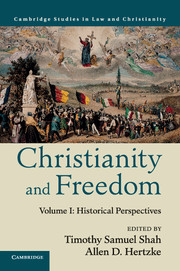Book contents
- Frontmatter
- The Religious Freedom Research Project
- Contents
- Contributing Authors
- Acknowledgments
- Introduction: Christianity and Freedom: Ancient Roots and Historical Innovations
- 1 The Roots of Religious Freedom in Early Christian Thought
- 2 The Christian Roots of Religious Freedom
- 3 Lactantius on Religious Liberty and His Influence on Constantine
- 4 Augustine and Religious Freedom
- 5 Christianity and the Roots of Human Dignity in Late Antiquity
- 6 Liberty of Conscience and Freedom of Religion in the Medieval Canonists and Theologians
- 7 Faith, Liberty, and the Defense of the Poor: Bishop Las Casas in the History of Human Rights
- 8 Calvinist Contributions to Freedom in Early Modern Europe
- 9 Constitutional Protection of the Freedom of Conscience in Colonial America: The Rhode Island and Pennsylvania Experiments
- 10 Christianity and Freedom in the American Founding
- 11 Vibrant Christian Pluralism and the Evolution and Defense of Religious Liberty in America
- 12 Orthodox Christian Contributions to Freedom: Historical Foundations, Contemporary Problematics
- 13 Christianity: A Straggler on the Road to Liberty?
- 14 Protestant Missionaries and the Centrality of Conversion Attempts for the Spread of Education, Printing, Colonial Reform, and Political Democracy
- 15 God and Freedom: Biblical Roots of the Western Idea of Liberty
- Index
9 - Constitutional Protection of the Freedom of Conscience in Colonial America: The Rhode Island and Pennsylvania Experiments
Published online by Cambridge University Press: 05 May 2016
- Frontmatter
- The Religious Freedom Research Project
- Contents
- Contributing Authors
- Acknowledgments
- Introduction: Christianity and Freedom: Ancient Roots and Historical Innovations
- 1 The Roots of Religious Freedom in Early Christian Thought
- 2 The Christian Roots of Religious Freedom
- 3 Lactantius on Religious Liberty and His Influence on Constantine
- 4 Augustine and Religious Freedom
- 5 Christianity and the Roots of Human Dignity in Late Antiquity
- 6 Liberty of Conscience and Freedom of Religion in the Medieval Canonists and Theologians
- 7 Faith, Liberty, and the Defense of the Poor: Bishop Las Casas in the History of Human Rights
- 8 Calvinist Contributions to Freedom in Early Modern Europe
- 9 Constitutional Protection of the Freedom of Conscience in Colonial America: The Rhode Island and Pennsylvania Experiments
- 10 Christianity and Freedom in the American Founding
- 11 Vibrant Christian Pluralism and the Evolution and Defense of Religious Liberty in America
- 12 Orthodox Christian Contributions to Freedom: Historical Foundations, Contemporary Problematics
- 13 Christianity: A Straggler on the Road to Liberty?
- 14 Protestant Missionaries and the Centrality of Conversion Attempts for the Spread of Education, Printing, Colonial Reform, and Political Democracy
- 15 God and Freedom: Biblical Roots of the Western Idea of Liberty
- Index
Summary
INTRODUCTION
It is now clear that an important source of modern constitutionalism, including, eventually, the protection of freedom of conscience and other rights, were the colonial covenants and compacts established by Anglo-American Puritans in the seventeenth century. Whatever their other differences, American Puritans “in their towns and congregations” were of one mind that “the crucial feature of all covenants” is “a people's willing consent,” that “covenant [is thus an] instrument and expression of popular decision-making.”
According to a leading authority, the Charter of Massachusetts Bay of 1629 “was not strictly a popular constitution, because it was in form and legal effect a royal grant, but in its practical operation after the transfer, it approximated a popular constitution more closely than any other instrument of government in actual use up to that time in America or elsewhere in modern times.” The Puritan authorities went well beyond the original wording, claiming that their charter permitted an astounding degree of political independence. As early as 1641, they refused help from the English Parliament because the colony might “then be subject to all such laws as [the Parliament] should make or at least such as [it] might impose upon us.” When in 1646 the authorities were criticized for considering themselves “rather a free state than a colony or corporation of England,” they agreed! Parliament might have authority in England, but “the highest authority here is in [our legislature], both by our charter and by our own positive laws…. Our allegiance binds us not to the laws of England any longer than we live in England,” an interpretation applying to the charters and compacts of the other colonies, as well. Though the colonials were slow to admit it, it was not a large step to the eventual replacement of the authority of the English Crown, as well as of Parliament, with the will of “the people” who inhabited the colonies.
A critical part of these early constitutions was the declarations of rights that were included. The Body of Liberties, adopted by the Massachusetts Bay legislature in 1641, amounted to an exceptionally lengthy list of fundamental rights. Though it incorporated provisions from English statutes and precedents, it went well beyond them.
- Type
- Chapter
- Information
- Christianity and Freedom , pp. 235 - 263Publisher: Cambridge University PressPrint publication year: 2016
- 1
- Cited by

